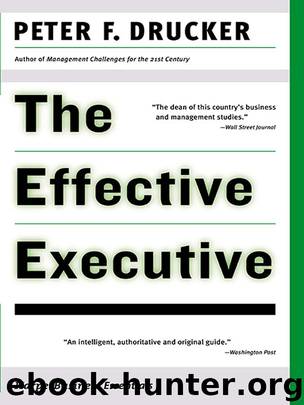The Effective Executive (Harperbusiness Essentials) by Peter F. Drucker

Author:Peter F. Drucker
Language: eng
Format: mobi
Publisher: HarperCollins
Published: 2009-10-05T14:00:00+00:00
5: First Things First
If there is any one “secret” of effectiveness, it is concentration. Effective executives do first things first and they do one thing at a time.
The need to concentrate is grounded both in the nature of the executive job and in the nature of man. Several reasons for this should already be apparent: There are always more important contributions to be made than there is time available to make them. Any analysis of executive contributions comes up with an embarrassing richness of important tasks; any analysis of executives’ time discloses an embarrassing scarcity of time available for the work that really contributes. No matter how well an executive manages his time, the greater part of it will still not be his own. Therefore, there is always a time deficit.
The more an executive focuses on upward contribution, the more will he require fairly big continuous chunks of time. The more he switches from being busy to achieving results, the more will he shift to sustained efforts—efforts which require a fairly big quantum of time to bear fruit. Yet to get even that half-day or those two weeks of really productive time requires self-discipline and an iron determination to say “No.”
Similarly, the more an executive works at making strengths productive, the more will he become conscious of the need to concentrate the human strengths available to him on major opportunities. This is the only way to get results.
But concentration is dictated also by the fact that most of us find it hard enough to do well even one thing at a time, let alone two. Mankind is indeed capable of doing an amazingly wide diversity of things; humanity is a “multipurpose tool.” But the way to apply productively mankind’s great range is to bring to bear a large number of individual capabilities on one task. It is concentration in which all faculties are focused on one achievement.
We rightly consider keeping many balls in the air a circus stunt. Yet even the juggler does it only for ten minutes or so. If he were to try doing it longer, he would soon drop all the balls.
People do, of course, differ. Some do their best work when doing two tasks in parallel at the same time, thus providing a change of pace. This presupposes however that they give each of the two tasks the minimum quantum needed to get anything done. But few people, I think, can perform with excellence three major tasks simultaneously.
There was Mozart, of course. He could, it seems, work on several compositions at the same time, all of them masterpieces. But he is the only known exception. The other prolific composers of the first rank—Bach, for instance, Handel, or Haydn, or Verdi—composed one work at a time. They did not begin the next until they had finished the preceding one, or until they had stopped work on it for the time being and put it away in the drawer. Executives can hardly assume that they are “executive Mozarts.”
Concentration is necessary precisely because the executive faces so many tasks clamoring to be done.
Download
This site does not store any files on its server. We only index and link to content provided by other sites. Please contact the content providers to delete copyright contents if any and email us, we'll remove relevant links or contents immediately.
Hit Refresh by Satya Nadella(9116)
The Compound Effect by Darren Hardy(8919)
Change Your Questions, Change Your Life by Marilee Adams(7732)
Nudge - Improving Decisions about Health, Wealth, and Happiness by Thaler Sunstein(7689)
The Black Swan by Nassim Nicholas Taleb(7097)
Deep Work by Cal Newport(7057)
Rich Dad Poor Dad by Robert T. Kiyosaki(6596)
Daring Greatly by Brene Brown(6501)
Principles: Life and Work by Ray Dalio(6403)
Playing to Win_ How Strategy Really Works by A.G. Lafley & Roger L. Martin(6207)
Man-made Catastrophes and Risk Information Concealment by Dmitry Chernov & Didier Sornette(6001)
Big Magic: Creative Living Beyond Fear by Elizabeth Gilbert(5745)
Digital Minimalism by Cal Newport;(5745)
The Myth of the Strong Leader by Archie Brown(5491)
The Slight Edge by Jeff Olson(5405)
Discipline Equals Freedom by Jocko Willink(5373)
The Motivation Myth by Jeff Haden(5202)
The Laws of Human Nature by Robert Greene(5156)
Stone's Rules by Roger Stone(5078)
